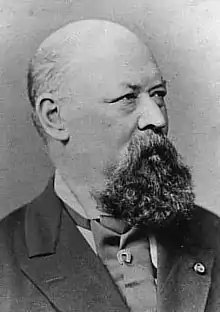Boccaccio (operetta)
Boccaccio, oder Der Prinz von Palermo (Boccaccio, or the Prince of Palermo) is an operetta in three acts by Franz von Suppé to a German libretto by Camillo Walzel and Richard Genée, based on the play by Jean-François Bayard, Adolphe de Leuven, Léon Lévy Brunswick and Arthur de Beauplan, based in turn on The Decameron by Giovanni Boccaccio.
| Boccaccio | |
|---|---|
| Operetta by Franz von Suppé | |
 The composer of the operetta, c. 1885 | |
| Native title | Boccaccio, oder Der Prinz von Palermo |
| Translation | Boccaccio, or the Prince of Palermo |
| Librettist | |
| Language | German |
| Premiere | |
The opera was first performed at the Carltheater, Vienna, on 1 February 1879.
An English translation was done by Oscar Weil and Gustav Hinrichs around 1883.[2]
Roles and role creators
| Role | Voice type | Premiere cast, 1 February 1879[3] |
|---|---|---|
| Fiametta, Lambertuccio's foster-daughter | soprano | Rosa Streitmann |
| Giovanni Boccaccio, novelist and poet | mezzo-soprano | Antonie Link |
| Beatrice, Lambertuccio's wife | soprano | |
| Isabella, Lotteringhi's wife | mezzo-soprano | |
| Peronella | contralto | |
| Pietro, Prince of Palermo | tenor | |
| Lambertuccio, the grocer | baritone | |
| Lotteringhi, the cooper | baritone | Franz Tewele |
| Scalza, the barber | baritone | |
| Leonello, Boccaccio's student friend | baritone | |
| Checco, a beggar | bass | Carl Blasel |
| Fratelli, the bookseller | baritone | |
| Majordomo | baritone | |
| Beggars, students, servants, Donna Pulci's daughters – chorus | ||
Synopsis
- Time: 1331.
- Place: Florence.
In early-Renaissance Florence, the erotic novellas of the poet Boccaccio cause a stir and the locals are divided into the female fans of his scandalous tales and their jealous husbands. A plot is hatched by the husbands to chase Boccaccio from the city and have him locked up. But Boccaccio has other plans, including one to win the hand of the Duke's daughter Fiammetta, which he finally succeeds in doing after finding favour with the Duke. Suppé's finest operetta.
Arias, duets, and ensembles
- "Ich sehe einen jungen Mann dort stehn" (Boccaccio)
- "Hab' ich nur deine Liebe" (Fiametta, later with Boccaccio)
- Act 1 Finale (book-burning)
- Serenade (Boccaccio, Pietro, Leonetto)
- Cooper's Song (Lotteringhi)
- Waltz trio "Wie pocht mein Herz so ungestüm" (Fiametta, Isabella, Peronella)
- Lovers' sextet
- Duet "Florenz hat schöne Frauen (Mia bella florentina)" (Fiametta, Boccaccio)
- Act 3 Finale (Boccaccio's counsel)
References
- Heinrich von Littrow, der echte Textautor von Suppès „Boccaccio“-Hit „Hab‘ ich nur Deine Liebe“
- "Von Suppé's sparkling comic opera in three acts, entitled: Boccaccio / libretto by Messrs. Reece & Farine", via Trove. Retrieved 28 July 2013
- Casaglia, Gherardo (2005)."Boccaccio, 1 February 1879". L'Almanacco di Gherardo Casaglia (in Italian).
Further reading
- Lamb, Andrew (1992), "Boccaccio" in The New Grove Dictionary of Opera, ed. Stanley Sadie (London) ISBN 0-333-73432-7
External links
| Wikimedia Commons has media related to Boccaccio (operetta). |
- Boccaccio (Suppé): Scores at the International Music Score Library Project
- Synopsis at music.yodelout.com